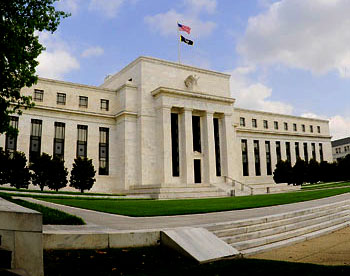Should the proposed Consumer Finance Protection Agency be part of the Fed? Or should it be a standalone agency? The general lefty view is that a standalone agency would be more powerful and more independent, and conservatives  seem to agree. That’s why liberals mostly like the idea of a standalone CFPA and conservatives don’t.
seem to agree. That’s why liberals mostly like the idea of a standalone CFPA and conservatives don’t.
But is this true? After reviewing Reputation and Power, a monumental history of the FDA, Steven Teles says the conventional wisdom just might be wrong:
The Fed is taken seriously by the financial industry itself, and because of its reputation and more attractive salary schedule it is substantially more able to attract talent than other federal regulatory agencies. If placed inside the Fed, the CFPA would be able to build a strong, clear organizational image (especially if it were given the insulation from the rest of the Fed that Senator Dodd’s bill would provide, including near-complete control over its own budget). This would help foster the political will to grant the agency the autonomy it needs to effectively regulate the financial industry.
….Second, in building an agency with the kind of power that the FDA had at its height, personnel matters. An agency with the ability to control, at least to some degree, its political destiny and strike fear into the hearts of those it regulates requires not only high-quality people, but also people possessed of a particular regulatory spirit. The FDA encouraged the development of the nascent field of clinical pharmacology and then recruited adherents to the agency. This gave the FDA a built-in coherence, and thus the ability to develop a strong organizational culture. The CFPA would need to do the same thing, perhaps by hiring the best behavioral economists from academia to lead the agency, and sponsoring research by those on the outside. This, again, might be easier to do from within the Fed, with its preexisting reputation and more generous salaries, than it would be in a brand-new agency.
Hmmm. Clearly the Fed has lots of expertise in the financial markets, and in theory that could help a newly formed CFPA to hit the ground running. On the other hand, the Fed is, pretty clearly, already a victim of regulatory capture. What’s more, its expertise and respect is almost entirely in the area of macroeconomic management, not regulation. A CFPA inside the Fed would never be more than a redheaded stepchild to the big wheels setting monetary policy.
Still, I notice that the first of Teles’s reasons for endorsing the Fed approach includes the fact that it would allow the CFPA to inherit its “more attractive salary schedule.” And the second of his reasons includes the fact that a Fed agency could offer “more generous salaries.” These are magic words, and I gather from this that salary schedules at the Fed are higher than standard federal GS schedules. I didn’t know that. Everything else aside, that might be reason enough to prefer a Fed-based CFPA.















